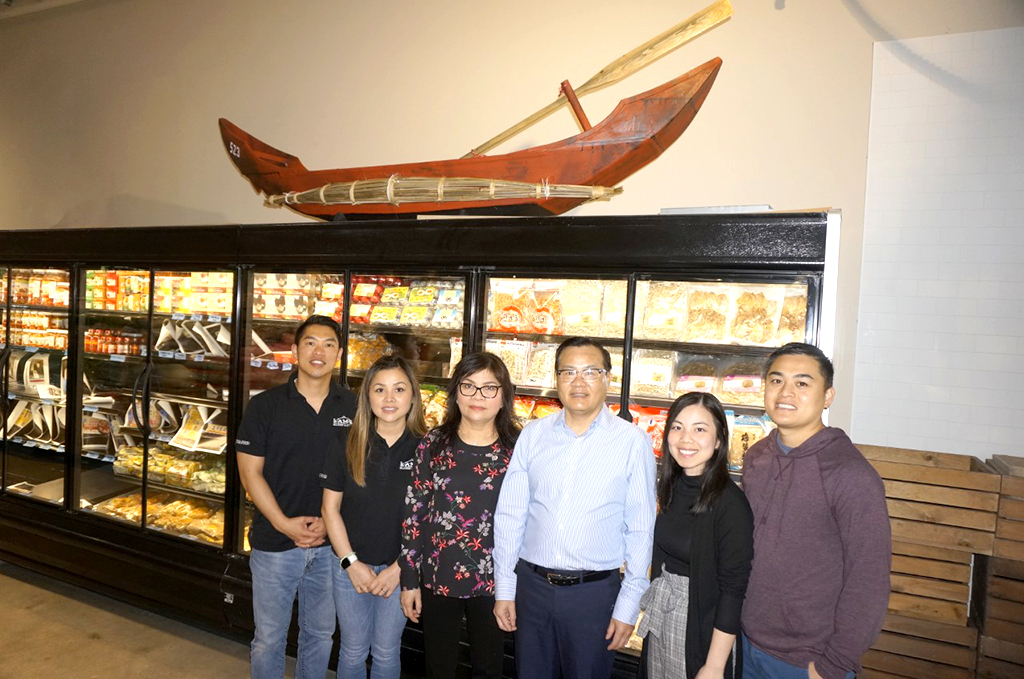By Ruth Bayang
NORTHWEST ASIAN WEEKLY

SEATTLE — Seattle grocery workers just got a raise.
The new temporary, emergency Grocery Employee Hazard Pay Ordinance (GEHP) took effect on Feb. 3. Grocery store businesses that employ more than 500 employees worldwide are now required to provide a hazard pay of $4 per hour to their employees during the COVID-19 emergency. “We absolutely understand the rationale behind hazard pay and agree that grocery store employees deserve to be compensated for the risk they take by facing hundreds of customers daily,” said Leeching Tran, owner of Viet-Wah Asian Food Market.
In an 8-0 vote on Jan. 25, the City Council passed the legislation which does not apply to convenience stores or food marts primarily selling a limited line of goods, or farmers markets.

From left: Store director Warren Hutch, development manager Miye Moriguchi, and CEO Denise Moriguchi. (Photo by Assunta Ng/NWAW)
Denise Moriguchi is the CEO of Uwajimaya—which has fewer than 500 employees—so the store doesn’t meet the threshold for this new requirement.
Still, Moriguchi told the Northwest Asian Weekly that the company has been paying its frontline workers who engage with customers face-to-face a pay bonus of $1.50 per hour on top of regular wages since March 2020. As of Jan. 30, that increased to $2 over regular wages.
“Uwajiyama has prioritized the safety of our customers and our employees,” said Moriguchi. “In that regard, I am 100% aligned with the bill,” though she wondered if the bill gives the message that other essential workers are not important.
“Why this group and not another group?” she said.

From left: David Tran, Nhung Tran, Kim Le-Nguyen, George Nguyen, Trinh Pham, and Terry Nguyen (Photo by George Liu)
Another Asian-owned grocery store, Lam’s Seafood Market, also does not meet the 500-employee requirement.
“However, I could see how this will have a greater indirect impact on our businesses,” said David Tran, general manager. One of the negative effects of this bill is the immediate increase of grocery prices, he said. And that’s not all.
“Knowing how progressive Seattle is, I would bet that the 500-employee requirement is just a test at the beginning… they will use the same arguments to lower the requirements for future proposals.”
Tran would have prefered a tax break for grocery stores “so that we can better compensate our employees… and help us lower the prices of groceries and that will directly benefit everyone.”

Duc Tran and his daughter Leeching
Leeching Tran said, “Although the $4/hour hazard pay requirement doesn’t directly affect small businesses, we once again find ourselves competing with the large companies and their vast resources. We have been paying our employees bonuses since the beginning of the pandemic as appreciation for the risk they take coming to work each day and have done our best to adapt our stores to ever-changing safety standards to keep our staff and customers safe, without any government assistance. It has already been a challenge to keep our stores adequately staffed, but with other grocery employers paying significantly higher wages, we are worried about employees leaving to work for bigger companies that pay more.”
Moriguchi also wondered about the long-term impacts of this bill.
“Could this potentially cause a food desert in some areas that may really need access to food?” She said prioritizing more essential workers for the vaccine would increase the safety for all.
Seattle joins a national effort to require hazard pay for grocery store workers in cities, including Berkeley, Long Beach, Los Angeles, San Francisco, West Hollywood, Berkeley, Oakland, Montebello, and Los Angeles County.
Ruth can be reached at editor@nwasianweekly.com.



